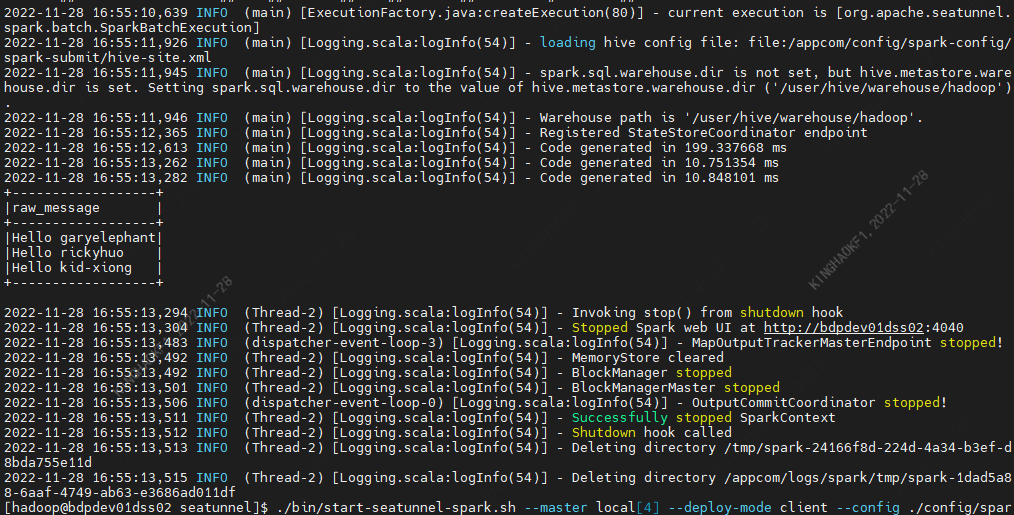Seatunnel Engine
This article mainly introduces the installation, usage and configuration of the Seatunnel engine plugin in Linkis.
1. Pre-work
1.1 Engine installation
If you want to use Seatunnel engine on your Linkis service, you need to install Seatunnel engine. Moreover, Seatunnel depends on the Spark or Flink environment. Before using the linkis-seatunnel engine, it is strongly recommended to run through the Seatunnel environment locally.
Seatunnel 2.1.2 download address: https://dlcdn.apache.org/seatunnel/2.1.2/apache-seatunnel-incubating-2.1.2-bin.tar.gz
| Environment variable name | Environment variable content | Required or not |
|---|---|---|
| JAVA_HOME | JDK installation path | Required |
| SEATUNNEL_HOME | Seatunnel installation path | required |
| SPARK_HOME | Spark installation path | Seatunnel needs to run based on Spark |
| FLINK_HOME | Flink installation path | Seatunnel execution is based on Flink |
Table 1-1 Environment configuration list
| Linkis variable name | variable content | required |
|---|---|---|
| wds.linkis.engine.seatunnel.plugin.home | Seatunnel installation path | Yes |
1.2 Engine Environment Verification
Take the execution of Spark tasks as an example
cd $SEATUNNEL_HOME
./bin/start-seatunnel-spark.sh --master local[4] --deploy-mode client --config ./config/spark.batch.conf.template
The output is as follows:

2. Engine plugin deployment
2.1 Engine plugin preparation (choose one) non-default engine
Method 1: Download the engine plug-in package directly
Method 2: Compile the engine plug-in separately (requires maven environment)
# compile
cd ${linkis_code_dir}/linkis-engineconn-plugins/seatunnel/
mvn clean install
# The compiled engine plug-in package is located in the following directory
${linkis_code_dir}/linkis-engineconn-plugins/seatunnel/target/out/
EngineConnPlugin Engine Plugin Installation
2.2 Upload and load engine plugins
Upload the engine package in 2.1 to the engine directory of the server
${LINKIS_HOME}/lib/linkis-engineplugins
The directory structure after uploading is as follows
linkis-engineconn-plugins/
├── seat tunnel
│ ├── dist
│ │ └── 2.1.2
│ │ ├── conf
│ │ └── lib
│ └── plugin
│ └── 2.1.2
2.3 Engine refresh
2.3.1 Restart and refresh
Refresh the engine by restarting the linkis-cg-linkismanager service
cd ${LINKIS_HOME}/sbin
sh linkis-daemon.sh restart cg-linkismanager
2.3.2 Check whether the engine is refreshed successfully
You can check whether the last_update_time of the linkis_engine_conn_plugin_bml_resources table in the database is the time to trigger the refresh.
#login to `linkis` database
select * from linkis_cg_engine_conn_plugin_bml_resources;
3. Engine usage
3.1 Submit tasks through Linkis-cli
sh ./bin/linkis-cli --mode once -code 'test' -engineType seatunnel-2.1.2 -codeType sspark -labelMap userCreator=hadoop-seatunnel -labelMap engineConnMode=once -jobContentMap code='env {
spark.app.name = "SeaTunnel"
spark.executor.instances = 2
spark.executor.cores = 1
spark.executor.memory = "1g"
}
source {
Fake {
result_table_name = "my_dataset"
}
}
transform {}
sink {Console {}}' -jobContentMap master=local[4] -jobContentMap deploy-mode=client -sourceMap jobName=OnceJobTest -submitUser hadoop -proxyUser hadoop
3.2 Submit tasks through OnceEngineConn
OnceEngineConn calls LinkisManager's createEngineConn interface through LinkisManagerClient, and sends the code to the created Seatunnel engine, and then Seatunnel engine starts to execute. The use of Client is also very simple, first create a new maven project, or introduce the following dependencies in the project
<dependency>
<groupId>org.apache.linkis</groupId>
<artifactId>linkis-computation-client</artifactId>
<version>${linkis.version}</version>
</dependency>
Example Code
package org.apache.linkis.computation.client;
import org.apache.linkis.common.conf.Configuration;
import org.apache.linkis.computation.client.once.simple.SubmittableSimpleOnceJob;
import org.apache.linkis.computation.client.utils.LabelKeyUtils;
public class SeatunnelOnceJobTest {
public static void main(String[] args) {
LinkisJobClient.config().setDefaultServerUrl("http://ip:9001");
String code =
"\n"
+ "env {\n"
+ " spark.app.name = \"SeaTunnel\"\n"
+ "spark.executor.instances = 2\n"
+ "spark.executor.cores = 1\n"
+ " spark.executor.memory = \"1g\"\n"
+ "}\n"
+ "\n"
+ "source {\n"
+ "Fake {\n"
+ " result_table_name = \"my_dataset\"\n"
+ " }\n"
+ "\n"
+ "}\n"
+ "\n"
+ "transform {\n"
+ "}\n"
+ "\n"
+ "sink {\n"
+ " Console {}\n"
+ "}";
SubmittableSimpleOnceJob onceJob =
LinkisJobClient.once()
.simple()
.builder()
.setCreateService("seatunnel-Test")
.setMaxSubmitTime(300000)
.addLabel(LabelKeyUtils.ENGINE_TYPE_LABEL_KEY(), "seatunnel-2.1.2")
.addLabel(LabelKeyUtils.USER_CREATOR_LABEL_KEY(), "hadoop-seatunnel")
.addLabel(LabelKeyUtils.ENGINE_CONN_MODE_LABEL_KEY(), "once")
.addStartupParam(Configuration.IS_TEST_MODE().key(), true)
.addExecuteUser("hadoop")
.addJobContent("runType", "sspark")
.addJobContent("code", code)
.addJobContent("master", "local[4]")
.addJobContent("deploy-mode", "client")
.addSource("jobName", "OnceJobTest")
.build();
onceJob. submit();
System.out.println(onceJob.getId());
onceJob. waitForCompleted();
System.out.println(onceJob.getStatus());
LinkisJobMetrics jobMetrics = onceJob. getJobMetrics();
System.out.println(jobMetrics.getMetrics());
}
}
4. Engine configuration instructions
4.1 Default Configuration Description
| Configuration | Default | Description | Required |
|---|---|---|---|
| wds.linkis.engine.seatunnel.plugin.home | /opt/linkis/seatunnel | Seatunnel installation path | true |
4.2 Configuration modification
If the default parameters are not satisfied, there are the following ways to configure some basic parameters
4.2.1 Client Configuration Parameters
sh ./bin/linkis-cli --mode once-code 'test' \
-engineType seatunnel-2.1.2 -codeType sspark\
-labelMap userCreator=hadoop-seatunnel -labelMap engineConnMode=once \
-jobContentMap code='env {
spark.app.name = "SeaTunnel"
spark.executor.instances = 2
spark.executor.cores = 1
spark.executor.memory = "1g"
}
source {
Fake {
result_table_name = "my_dataset"
}
}
transform {}
sink {Console {}}' -jobContentMap master=local[4] \
-jobContentMap deploy-mode=client \
-sourceMap jobName=OnceJobTest\
-runtimeMap wds.linkis.engine.seatunnel.plugin.home=/opt/linkis/seatunnel \
-submitUser hadoop -proxyUser hadoop
4.2.2 Task interface configuration
Submit the task interface and configure it through the parameter params.configuration.runtime
Example of http request parameters
{
"executionContent": {"code": 'env {
spark.app.name = "SeaTunnel"
spark.executor.instances = 2
spark.executor.cores = 1
spark.executor.memory = "1g"
}
source {
Fake {
result_table_name = "my_dataset"
}
}
transform {}
sink {Console {}}',
"runType": "sql"},
"params": {
"variable": {},
"configuration": {
"runtime": {
"wds.linkis.engine.seatunnel.plugin.home":"/opt/linkis/seatunnel"
}
}
},
"labels": {
"engineType": "seatunnel-2.1.2",
"userCreator": "hadoop-IDE"
}
}